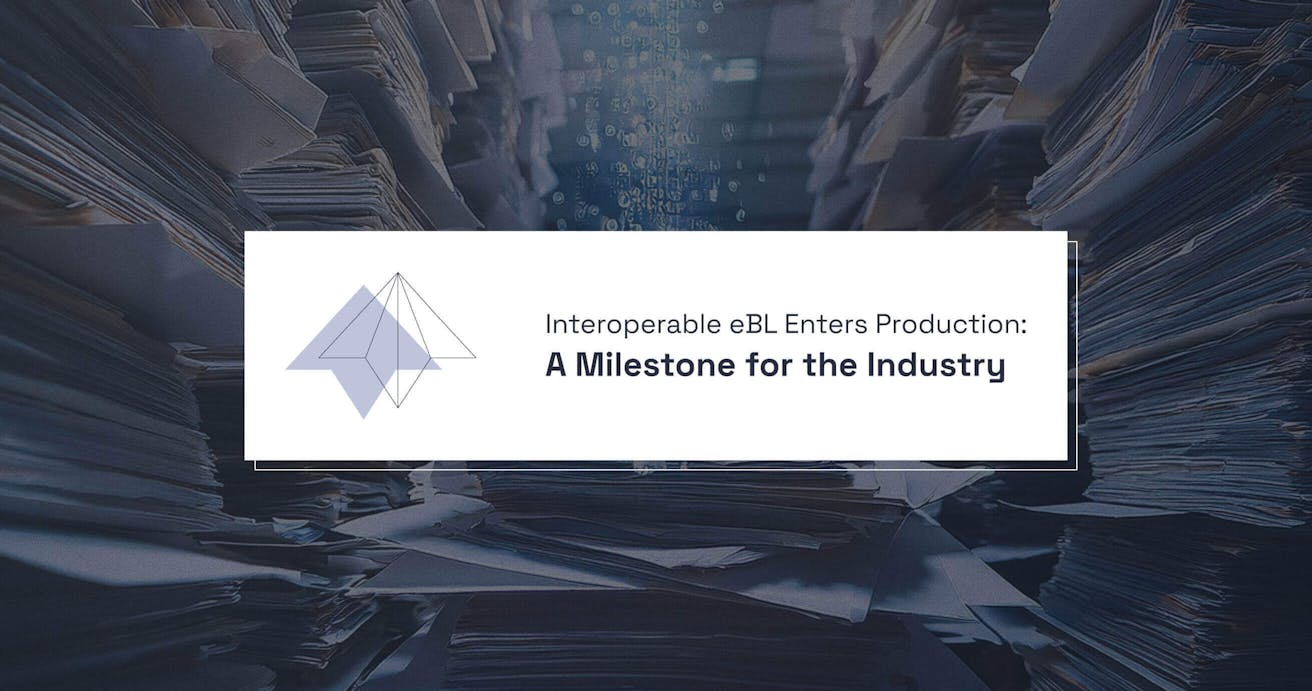
Interoperable eBL Enters Production: A Milestone for the Industry
CargoX, HMM, Suzano and EdoxOnline partner with DCSA in major milestone
Ljubljana, 15 May 2025: The first live, standards-based interoperable electronic Bill of Lading (eBL) transaction has gone into production, marking a major milestone in the journey to scalable, secure and paperless global trade.
The first live transaction was completed between CargoX and EdoxOnline, involving carrier HMM and shipper Suzano, fully implementing the Digital Container Shipping Association’s (DCSA) data standards and interoperability components.
While non-standard, bilateral integrations already exist, this development marks the beginning of multilateral interoperability, built on shared legal and technical foundations that enable eBLs to move seamlessly between platforms. At a time when many cargo owners are hesitant to adopt new technologies until industry peers or partners do, having a fully interoperable eBL will accelerate global trade’s digitalisation journey.
This first successful interoperable eBL transaction represents a breakthrough in addressing interoperability challenges, powered by DCSA's interoperability framework with three essential components:
Platform Interoperability (PINT) API – Standardized integration enabling transfer of DCSA-compliant eBLs between solution providers.
Legal Framework – A multilateral agreement governing eBL solution providers' relationships, with standardized terms for users.
Control Tracking Registry (CTR) – Secure log tracking which platform controls each eBL, building trust essential for global trade.
These foundational components are fully aligned with DCSA’s recently released eBL data standards, establishing the legal and technical basis for secure, scalable, and interoperable digital trade.
Bojan Čekrlić, CEO of CargoX, said:
“Global trade needs multiple parties to work, and the digitalisation of trade needs those parties to share data and documentation easily. Concerns around what is truly interoperable and what changes must be made to existing systems have held back adoption of innovations such as eBL. With interoperable EBL, we’ve overcome that obstacle.”
John Kim, Senior Manager Digital at HMM, said:
"We recognize the value of interoperability between eBL solution providers to achieve DCSA's '100% eBL by 2030' goal. It was an incredible experience to participate in this interoperability pilot as a carrier and see eBL being sent to our shipper, Suzano, on two different platforms in real time."
“We truly value our collaboration with CargoX as one of the first eBL solution providers to implement DCSA’s interoperability components and the Control Tracking Registry. Their forward-leaning mindset and willingness to lead by example are helping drive meaningful change in the industry. We applaud their initiative and hope it inspires others to join the movement toward seamless digital trade.”
"Suzano's participation in the first standards-based interoperable eBL transaction reflects our commitment to innovation and operational excellence," remarked Targe Bock, COO Suzano Europe. "This achievement shows how collaboration can unlock real value and drive efficiencies across the supply chain."
Alejandro Pernías, President and CEO at EdoxOnline, commented:
"This fully interoperable eBL live transaction demonstrates that title-data can seamlessly be transferred digitally across multiple platforms, streamlining trade execution without relying on a single eBL provider. We remain committed to driving eBL adoption to help the international trade community harness the benefits of going paperless."
IGP&I-approved providers are jointly updating their legal frameworks to enable full-scale interoperability, laying the groundwork for broader adoption throughout 2025. For instance, Enigio and CargoX are preparing an interoperable transaction with HMM and a Fortune 500 shipper in Q2.
For more information, visit the DCSA Interoperability webpage or contact the CargoX team.
END
About CargoX
CargoX is one of the leading providers of blockchain-based electronic trade document solutions, enhancing trust in the digital economy. Its Blockchain Document Transfer (BDT) platform enables the creation, signing and transfer of electronic trade documents, and in 2018 it facilitated the first transfer of a blockchain-based electronic bill of lading (eBL). Today, more than 140,000 businesses and organisations worldwide use the platform, having processed over nine million documents to date.
About HMM
HMM Company Limited (formerly Hyundai Merchant Marine) is South Korea’s largest shipping company, providing global container, bulk, and intermodal logistics services. Founded in 1976 and headquartered in Seoul and Busan, HMM operates a worldwide network with over 70 offices across five continents. HMM plays a key role in advancing digital transformation in shipping. As a DCSA member carrier, HMM is committed to advancing the digitization of shipping processes and driving industry-wide adoption of standardized, paperless trade and interoperability of maritime logistics systems.
About DCSA
Digital Container Shipping Association (DCSA) is a neutral, non-profit organization founded by major ocean carriers to digitize and standardize the container shipping industry. With the mission of leading the industry towards systematic collaboration, DCSA drives initiatives to make container transportation services transparent, reliable, easy to use, secure, and environmentally friendly. DCSA's open-source standards are developed based on input from DCSA member carriers, industry stakeholders, and technology experts from other industries. DCSA member carriers include MSC, Maersk, CMA CGM, Hapag-Lloyd, ONE, Evergreen, Yang Ming, HMM, ZIM and PIL.
About Suzano
Suzano is the world's largest producer of eucalyptus pulp and one of Latin America's largest paper producers. The company is committed to sustainable practices and digital innovation in global trade.
About EdoxOnline
EdoxOnline, from Global Share S.A. in Buenos Aires, digitizes trade documents like eBLs, certificates of origin, and phytosanitary certs. Used by exporters, importers, and freight forwarders, it enables secure, real-time collaboration and meets recognized e-trading standards, including those of the International Group of P&I Clubs.